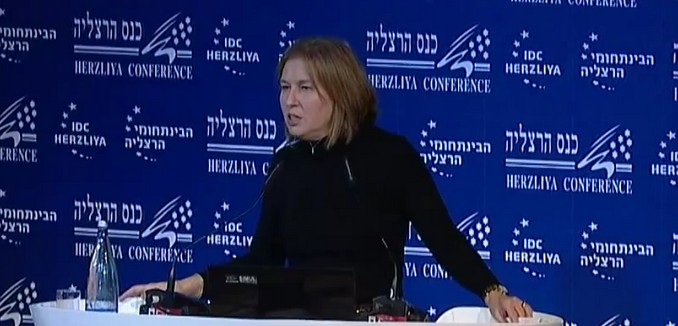In an interview in The New York Times published today, former Israeli chief negotiator Tzipi Livni detailed how Palestinian Authority President Mahmoud Abbas undermined the American-sponsored peace talks between Israel and the Palestinians.
Livni’s account, given to the Times‘s Roger Cohen, identified three specific episodes that led to the collapse of the talks.
On March 17, in a meeting in Washington, President Obama presented Mahmoud Abbas, the Palestinian leader, with a long-awaited American framework for an agreement that set out the administration’s views on major issues, including borderrs, security, settlements, Palestinian refugees and Jerusalem.
Livni considered it a fair framework, and Netanyahu had indicated willingness to proceed on the basis of it while saying he had reservations. But Abbas declined to give an answer in what his senior negotiator, Saeb Erekat, later described as a “difficult” meeting with Obama. Abbas remained evasive on the framework, which was never made public.
Despite this “important opportunity missed,” according to Livni, Secretary of State John Kerry prevailed on both sides to continue negotiating. Cohen writes that on April 1, the Israeli government had prepared a statement promising further prisoner releases and an agreement to negotiate past the April 29 deadline, with a commitment to slow down or freeze the building of Israeli settlements.
Then, Livni said, she looked up at a television as she awaited a cabinet meeting and saw Abbas signing letters as part of a process to join 15 international agencies — something he had said he would not do before the deadline.
She called Erekat and told him to stop the Palestinian move. He texted her the next day to say he couldn’t. They met on April 3. Livni asked why Abbas had done it. Erekat said the Palestinians thought Israel was stalling. A top Livni aide, Tal Becker, wrote a single word on a piece of paper and pushed it across the table to her: “Tragedy.”
After refusing to accept the American framework and then breaking his word and pursuing unilateral actions against Israel, Abbas showed his contempt for the peace process one more time.
Then, on April 23, a reconciliation was announced between Hamas and Abbas’s Fatah — something since proved empty. That, for Netanyahu and Livni, was the end: They were not prepared to engage, even indirectly, with Hamas.
One of the fundamental premises of the peace process is the Palestinian rejection of violence. By joining with the terrorist organization Hamas, the Palestinian Authority rejected that premise.
Cohen reports that “Livni met Abbas in London on May 15. ‘I said to him, the choice is not between everything and nothing. And your choice in the end was to get nothing.’”
Abbas’ refusal to accept the American framework is reminiscent of his rejection of a peace deal made to him by then-Israeli Prime Minister Ehud Olmert in 2008. His pursuit of unilateral moves to achieve statehood outside the framework of negotiations and his partnership with Hamas negate two of the principles of the peace process: the commitment that outstanding issues “will be resolved through negotiations,” and “renounc[ing] the use of terrorism.”
[Photo: HerziliyaConference / YouTube ]




